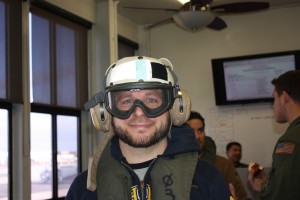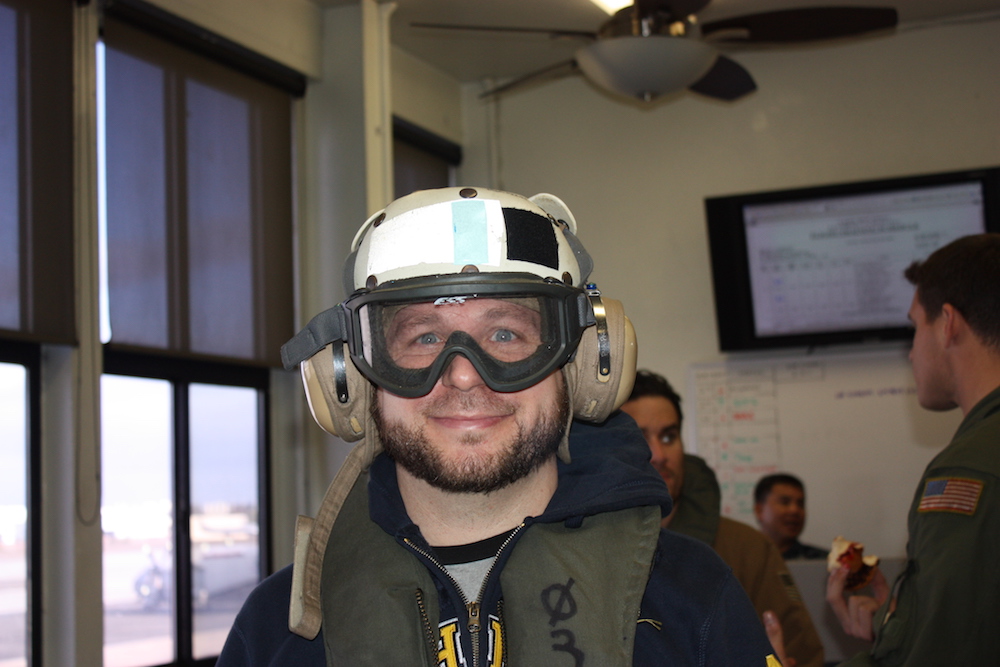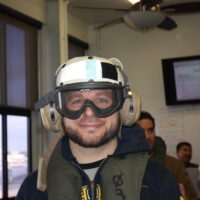Artist Booking and the Military Market
This article was originally published in June, 2011.
Ari Nisman is the President/CEO of Degy Entertainment, a booking agency that specializes in booking artists in the college and military markets. Ari got his start in the music industry when he was a college student at the University of Michigan, where he got involved in field marketing programs for college students at several major record labels working with up-and-coming bands in Michigan and in the Chicago area. He went on to work as a marketing representative with Polydor/Atlas Records, where he helped run marketing campaigns and develop acts including Jimmy Eat World, Luscious Jackson and Mazzy Star. After a brief stint as an A&R representative at a small indie label, he joined up with Capitol Records as a field marketing representative in Michigan and worked with artists such as George Clinton and John Spencer. He started Degy Management Services, Inc. in 1997 and its booking agency arm, Degy Entertainment in 2001.

I got to sit down with Ari and talk about how he got involved in the music industry, how he found his unique niche, and what it takes to get involved in the military market.
MC:
Thanks so much for taking the time to talk to me, Ari. First of all, how did you get started in the music industry?
AN:
I started back in college at the University of Michigan. Like many kids growing up, I was into sports and music, and I decided to pursue sports for a while. I got lucky enough to work with the Cleveland Indians organization in the baseball world for a bit. But I realized I had a bit more passion business wise for the music side of things. I hooked up with a couple of record labels who had field marketing programs for college students at the time. I worked with some up-and-coming bands around the Michigan and Chicago area. And then I stumbled upon bands that I began to develop for record labels. My field marketing guy transferred over to Capital Records and let me start working on some bigger projects like Radiohead, the Butthole Surfers and Jimmy Eat World. I was just a college field marketing guy out on the road doing record in stores, welcoming artists into town, helping acts backstage, loading gear. I remember Rusted Root was one of the ones I worked with back then, and sure enough, over the last seven years I’ve represented the lead singer of Rusted Root, so some things come full circle. Then I just decided I was going to sign my first band to management. I was probably too cocky of a 19-year old, confident college kid. There was a big band at the University of Michigan, and I decided to sign them to management and try to learn how to manage, and there we went.
MC:
How many years did you spend managing bands?
AN:
I probably managed acts until about 2002. But it was back on September 1, 2001 – and I vividly remember this because of 9/11 – that we started up the booking agency. I had brought in a couple agents from across the country who were sleeping on the floor of my office for some reason that day when the planes went over. When we were trying to start this agency, we were signing whichever acts we could find, because the acts on our management roster – even the baby bands – weren’t getting the big agencies to look at them. There was such a disparity between agencies like the William Morris and the Creative Artists Agency and the other big agency groups, and the shlubs in their houses trying to book bands, so we wanted to form some sort of middle agency. But it wasn’t originally built specifically around college market or the military market like it is now. We were just going to be an agency gunning for the big guys and trying to sign and book them in as many clubs and festivals as we could.
In those days, we signed a bunch of bands, got lucky with a couple of the first ones that were starting to make us money and took off from there. We developed a specialty over time.
MC:
Which types of bands did you work with?
AN:
Some of our earlier clients were people like Tito Puente, Jr., Colonel Bruce Hampton and the Codetalkers and then others like Perpetual Groove. A lot of the agents I hired back then seemed to be really into the jam band and hippie scene. We were developing young bands at the time. For example, Perpetual Groove ended up developing into a pretty sizeable jam band. The agents brought on a lot of the acts while I was still managing acts, so I let them really have a carte blanche on what was getting signed. It ended up being a lot of jam and groove bands, which wasn’t necessarily a scene I was into. And then I signed a lot of bands that were in the pop and rock world, so I think we had a varied focus.
MC:
And what made you decide to focus on the college and military market?
AN:
We call it niche booking. We found our niche and flew into it, and tried to take that ownership stake. While others were focusing on everything, we tried to focus on certain segments. It really started when I was working a management deal for an a capella group that wound up becoming the voices of the Cool Whip “Doin’ The Cool Whip” commercial. We struck a deal with overseas publishing company that had an office in Norway. A representative called me up and said, “You’re a booking agent, right?” And I said I was. And she said, “And you book colleges?” And I told her I booked some colleges. And then she asked if I had heard of the National Association for Campus Activities (NACA). Like any good businessman, I just nodded my head and said, “Yes,” even though I hadn’t, and then decided to figure out how to do it. And she said, “Great. We have a performance at the NACA West Conference in two weeks, are you going to be there?” And of course, we weren’t. But I said we were. And she asked me to represent the band there. And a big band from Norway, a band called Big Bang, who was the big budding star in the rock market there was going to be getting on a plane and were going to be our first client in the NACA college market. We showed up there and represented them. And we felt like we had a modicum of success, and like it was a business model we would be able to develop. Sure enough, we began to build this whole college profile, where we would submit to these conferences and try to get showcases. We just dove into the college market. We’ve been pretty successful at that for the last ten or so years and have developed one of the largest college agencies in the world. We often partner up with a lot of the major agencies.
The military market really came along as a result of the college market. About four or five years ago, one of the other college organizations, APCA gave an opportunity for some agents to show up in Las Vegas and speak for some of the major military players. Only about four or five agents took that opportunity. But I got on a plane, went to Las Vegas, met with the folks from the Army, Navy and the Marines. And after proving ourselves with some smaller shows in the initial years, we’ve now been able to make that a huge niche focus of our business. I think it’s more rewarding than anything I do to be able to book entertainment and see the smiles on the faces of our troops around the world.
I feel kind of special in that the two areas we’re known for – the college and the military market – are areas where first of all, you can help educate students who are going out into the world of the music business and really help to have an impact on those younger students; and then, I think there is no better feeling than being able to see a smile on the face of a soldier or a sailor overseas or even here domestically who has been away from their family and is on some tour of duty. You bring in a show that really brightens their day or becomes the soundtrack for the rest of their tour of duty. So, the two areas – in addition to all the other booking we do with festivals and the performing arts and clubs – that we’ve become known for are really areas where I feel that it goes beyond just booking. We also get to make an impact on people.
MC:
That’s fantastic. And how does an artist get booked for military events?
AN:
There’s no real showcase that I know of for the military market. They do have their own individual conferences. For example, the Army has the Boss Conference, the Navy has their meetings. A lot of the military personnel actually show up to the Association for the Promotion of Campus Activities (APCA) conferences specifically in Atlanta for the national conference. So, if you do get a showcase with APCA at the national conference, there are generally a good share of military buyers who are in the audience. Those people are normally just buying for their bases, or sometimes they have some of the folks that book overseas for a series of dates.
To understand the military, you have to break it down into four main entities: Armed Forces Entertainment (AFE); United Service Organization (USO), which is the big daddy everybody has heard of and that Bob Hope made famous; Navy and Army Entertainment, which are the Morale, Welfare and Recreation (MWR) divisions; private promoters, who are companies overseas and even some in the states that buy individually. Understanding those four entities gives you a better idea of what that market is all about.
AFE is a great organization. Colonel Weatherspoon and her team buy a lot of up-and-coming acts. They’ve been known the past couple years to really take a chance on some of the younger acts that are making a name for themselves but aren’t fully established yet. They pay on a per diem basis, plus cover your expenses. You have to qualify to get into the AFE program. After they accept you into the program, then they look at slotting you for their tours around the world.
Everyone knows about USO of course. They are a third-party entity and are not necessarily part of the military. They get their money through private contributions. The reason USO is so well publicized is often because the more well publicized you are, the more money and donorship you can bring in. You often get a mailer in the mail from them to help put money into the program. They then turn that money around and buy the talent to bring overseas. They generally don’t pay the artists, and I think it’s part of their credo that they don’t. But they do a great job of paying all the artists’ expenses and then some. But they have been known to bring out the heavy hitters like Bob Hope, Kenny Chesney.
Army and Navy Entertainment generally consist of people that work directly for the military, though they are not always enlisted. They are buying for either their individual bases or bases around the world. And you just have to get to those people and show them your stuff. Some of them have budgets, some of them don’t. Those are a lot of the people I buy for. We have a contract with the U.S. Army Entertainment, and we buy quite a bit for the U.S. Navy around the world. They will use different promoters and middling agents or sometimes go directly to dish out the right style of show to the right style of folks they buy with. They do a great job. And they are a little bit less publicized because they are actually the military, and thus they don’t really need to publicize what they do. Their goal is to take great entertainment directly to the troops. It’s not about fanfare or hoopla; it’s about making sure they bring the best quality entertainment to troops around the world.
To learn more about Ari Nisman and his company, please visit www.degy.com or follow him on Twitter. Also, check out Part II of this interview, where Ari talks about what artists need to know to get into the college market.









